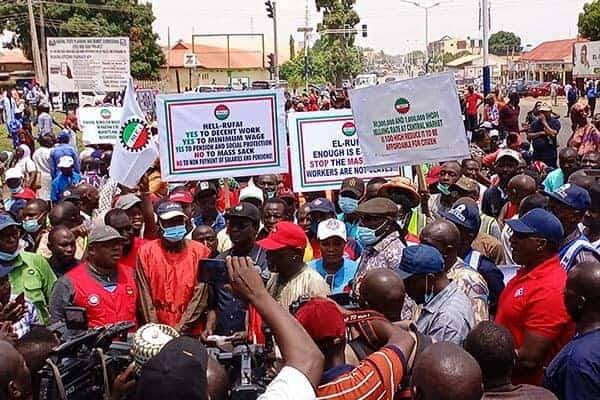By Michael Oche
A new wave of protests by workers to demand accountability by public officials appears to be spreading across Africa.
In the last one week, workers in Nigeria, Guinea, and Kenya have stormed the streets to demand improvement in working and living conditions for citizens.
How the public officials across the continent deal with a growing disenchantment by citizens is yet to be seen, but the wave of protest is a call to action and shows that more people are increasingly becoming unhappy.
In Guinea, two youths were tragically killed in Conakry on Monday as the government deployed lethal force to crackdown on the protesting workers, who began an indefinite strike action.
The general strike embarked by the Guinean Trade Union Movement, an umbrella group for multiple workers’ unions, highlights critical issues, including releasing detained workers, soaring food prices, and ceasing censorship, internet interference and implementation of a wage deal reached with the government in November.
Workers across the continent are increasingly demanding their rights to be heard as they express their views on the economic situation through peaceful demonstrations.
ITUC-Africa general secretary, Akhator Joel Odigie says workers have the right to assemble, to express dissent, and to demand accountability from those in power without intimidation, coercion, repression, and violence.
He insists that these are fundamental pillars of democracy that must be upheld and protected at all times.
Reacting to the Guinea incident, Odigie said the ITUC-Africa reiterates its support for a peaceful resolution that upholds the principles of justice, democracy, and human rights.
He urged the Guinea’s government to negotiate with workers and their representatives to reach a consensus on this socio-political impasse.
In Nigeria, workers led by the Nigeria Labour Congress (NLC) last Tuesday held a nationwide protest over worsening socio-economic situation in the country.
The workers alleged that they were threatened by the government, but they still went ahead. They were, however, forced to suspend the protest after the first day.
The Nigeria Labour Congress (NLC) and the Trade Union Congress (TUC) have, however, issued another 14-day ultimatum to the Federal Government over the non-implementation of the 16-point agreement both parties reached after the removal of the petrol subsidy.
The government had failed to implement agreements reached with workers as various policies by the government takes it toll on the economy.
Odigie cautioned that threats and warnings should not impede the exercise of legitimate labour rights; saying instead, “we encourage open dialogue to address the root causes of the current challenges that the nation faces. Prepping and utilising amorphous groups for hire entities such as the Nigeria Civil Society Forum to undermine and disrupt legitimate protests not only fuels violence, it is also counterproductive and archaic.”
In Kenya, the Kenya Medical Practitioners, Pharmacists and Dentists Union (KMPDU) last Monday held a demonstration to protest over the delayed posting of medical interns.
Dr. Davji Atellah, Secretary General of KMPDU was shockingly shot by the Kenyan police during the peaceful march and was rushed to Nairobi Hospital.
Dr. Atellah was rushed to Nairobi Hospital for treatment after he was reportedly shot at close range by a police office while leading a protest over the delayed posting of medical interns.
The growing protests among workers highlight the challenges being faced by citizens, which underscore the necessity of governments across the continent to address these socio-economic concerns.







